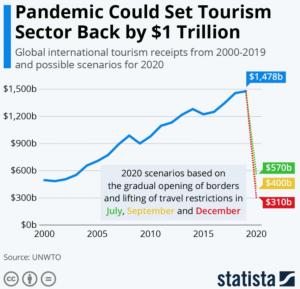How Travel Bans Affect the Vacation Industry

The vacation industry relies on the concept of people having the desire and ability to travel to new locations. This industry has been largely affected by travel restrictions that are placed due to the global pandemic (similar to health scares and disease breakouts like the SARS virus outbreak in 2004). The COVID-19 pandemic has triggered an extraordinary level of disorder in the global tourism industry. A mixture of local lockdowns and travel constraints has caused many hotels to pause their operations provisionally or run at a minute fragment of their actual capacity. As the pandemic keeps on extending its reach and duration, it is still uncertain what extent of the impact it will have on the vacation industry as a whole
However, predictions are that air passenger traffic will decrease from 50 to 60 percent in 2020. Also linked to air travel, airport revenues will decline by over 57 percent in 2020. Overall tourism is forecast to decrease from USD 910 to 1,170 billion from the total USD 1.5 trillion earned in 2019. The figures may be higher due to a 100 percent destination shutdown. All figures quoted here are taken from the International Civil Aviation Organization, a United Nations agency dedicated to regulating and improving international air travel.
The extent of Impact on Tourism
The tourism industry is used to handling disruptions to their operations. However, the sheer scale of the shutdown caused by the pandemic is unprecedented and has left the entire industry reeling globally. Past regional occurrences like earthquakes and hurricanes have caused a long-term shut down in the affected areas. Prime examples are the tsunami in East Asia, the hurricanes in the US, and the earthquake in Japan.
2020 has seen an extensive drop-in of clients looking to stopover in hotels and owners looking for alternatives to timeshare. Every travel-linked business has been affected. Every tourism-reliant region of the globe has been disturbed in some way. The chart below will highlight just how profound the impact is on the airline business:
The apparent impact has been a sharp drop in income as business travel and tourism both dived. Businesses in lockdown are utilizing video conferencing to conduct meetings with clients. Some countries are trying to recoup their losses by offering packages to their locals. These are priced at up to 40% less than their actual prices. Even then, the overall tourism industry has been impacted sharply.
The prevalent ambiguity and prolonged issues are making the situation worse for the industry. Hotel operators do not know with any certainty when travel bans ease, and when they are reduced to some extent, the spike in infections causes the governments to reimpose bans.
The uncertainty has left consumers confused, and they remain cautious about unnecessary traveling. In restaurants and time-sharing venues, social distancing requirements mean fewer patrons can be taken in for the near future. This reduction in capacity would mean that restaurants and other businesses may only raise a fraction of the revenue they earned before the pandemic.
Employment and Debt Management
Many businesses have been forced to cut down on costs by reducing their employees’ work hours or relying on governmental support packages. Doing this will raise more issues once visitors’ flow starts to increase as trained workers may not be available or willing to rejoin the industry. The question that arises is would employees be amenable to work limited hours for an extended time? Service quality is also likely to decline as businesses reduce employees and existing employees are overworked.
With most businesses reliant on debt, many hotel owners are trying to restructure their loans. This financial readjustment and structuring process can be taken as an opportunity for private equity and venture capitalists looking to come into the industry. People with liquidity can opt to invest in the tourism industry, but based on the future outlook of the area and the timeline for the industry’s revival internationally.
Restructuring debt would necessitate knowing when a hotel, restaurant, or timeshare location will generate revenue. While most countries are supporting businesses that are affected significantly, there is a limit to how much support and how long support will be provided. It is also not sure how long governments’ would be able to support such sectors.
Preparing for life in the new normal
The crisis can be the precursor to adopting digital and remote amenities like mobile or digital check-ins. It can also be taken as an opportunity to enhance customer experience all over the industry. However, how this can be done in an industry that is experiential and relies on the quality of human resources is still to be determined.
It is increasingly clear that it will take some time before the hospitality industry will go back to the way it was a year ago, even if the travel bans are lifted. It is also clear that the vacation industry has some tough decisions to make in the time ahead, as everyone starts to limp back towards recovery.

